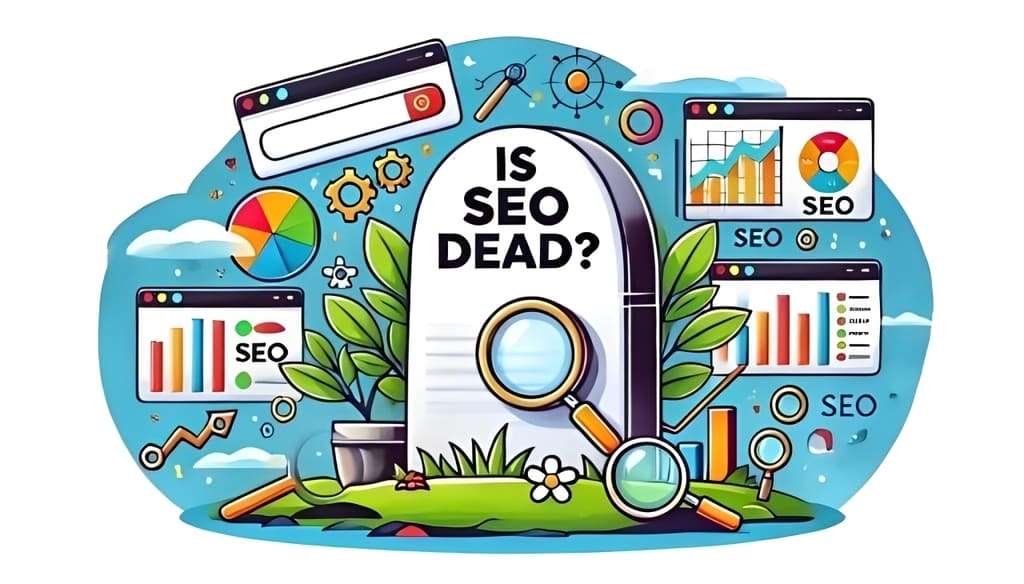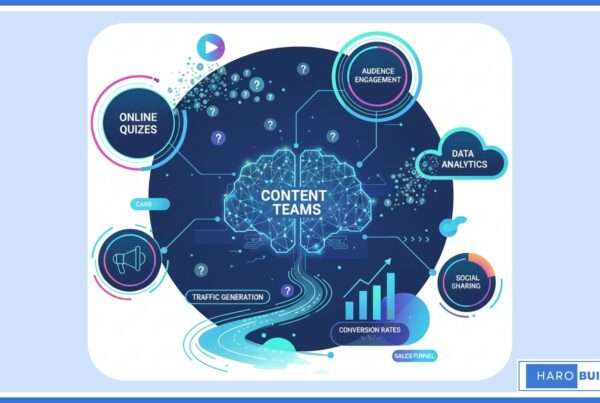
As artificial intelligence (AI) continues to reshape the digital landscape, everyone has the same question, Is SEO dead? The short answer – NO! AI-driven tools transform search engines, altering how users interact with search results. Traditional SEO tactics like keyword stuffing are becoming obsolete as search algorithms prioritize high-quality, user-centric content.
To remain competitive, marketers must integrate AI into their content strategies, focusing on delivering valuable information that aligns with user intent. This article provides a comprehensive guide on adapting to these changes, ensuring your digital marketing efforts remain effective in the evolving SEO landscape.
Is SEO Dead or Evolving in 2025?
SEO dead? Not quite! In 2025, SEO is evolving rather than disappearing. AI-driven search algorithms now focus on user intent, content quality, and contextual relevance. Traditional tactics like keyword stuffing and excessive backlinking no longer guarantee top rankings. Instead, Google’s Search Generative Experience (SGE) prioritizes structured, informative, and user-centric content.
Businesses must adapt by integrating AI tools for keyword research, content optimization, and real-time analytics. The shift demands a focus on expertise, trustworthiness, and value-driven content. As AI continues to refine search experiences, SEO remains vital but requires a modern approach. Staying ahead means embracing AI’s capabilities while maintaining strategic content creation.
How AI Is Shaping Search Results?
Artificial Intelligence (AI) has revolutionized how search results are generated, particularly with innovations like Google’s Search Generative Experience (SGE). Unlike traditional methods, SGE leverages Custom Generative AI Solution to interpret complex queries, offering users context-rich and precise responses. This shift prioritizes user intent over outdated practices like keyword stuffing and fostering high-quality and relevant content.
Consequently, marketers must adapt by focusing on optimization strategies that emphasize clarity, contextual alignment, and structured content capable of appearing in featured snippets. These advancements demand a strategic overhaul of digital marketing efforts for businesses, especially B2B.
AI tools now enable marketers to identify optimal search terms, optimize content for SERPs, and deliver actionable insights that align with user needs. Simultaneously, focusing on content quality requires avoiding keywords while creating data-driven strategies that resonate with evolving search algorithms. This transformation underscores the necessity for adaptability and innovation in today’s competitive digital landscape.
What Generative Experiences Mean for SEO Practices
Generative AI is reshaping SEO by shifting the focus from traditional ranking factors to user intent and content quality. Key impacts include:
- Enhanced search experiences: AI-generated responses provide users with more relevant and contextual results.
- Declining keyword reliance: SEO now prioritizes semantic search over exact-match keywords.
- Emphasis on structured content: Clear subheadings, lists, and concise explanations boost visibility.
- Branded search growth: Businesses optimizing for brand-related queries gain an advantage.
- Dynamic content adaptation: AI tools help marketers refine content strategies based on evolving search trends.
To succeed in AI-driven search, marketers must optimize for clarity, relevance, and user engagement.
The Role of AI in Transforming SEO Tactics
The integration of artificial intelligence (AI) in SEO is fundamentally reshaping the digital marketing landscape. Traditional SEO practices, which once focused on keyword density and backlinks, are becoming less effective. Instead, AI-driven tools and strategies prioritize user intent, content relevance, and enhanced search experiences. To maintain competitive search engine rankings, businesses must adapt to these changes.
How AI is Revolutionizing SEO Practices
AI is redefining SEO by improving how search engines evaluate and rank content.
- Improved User Experience: AI tools encourage the creation of content that addresses user intent over exact keyword matches.
- Enhanced Algorithms: Modern search engines prioritize trustworthiness and subject matter expertise, especially in organic branded searches.
- Google’s Generative AI: Features like the Search Generative Experience enhance user interactions with conversational and detailed search results.
- Diminishing Role of Backlinks: While backlinks remain relevant, AI algorithms now emphasize content quality and authority more significantly.
- Dynamic Content Optimization: AI platforms allow digital marketers to identify trends and adjust strategies quickly to match evolving algorithms.
Impact of Generative AI on Search Queries
Generative AI has transformed how users search and how marketers optimize content.
- Contextual Understanding: Search engines now interpret queries more contextually, reducing dependence on rigid keyword-focused content.
- Dynamic Suggestions: Generative AI tools provide personalized search results, encouraging a shift from traditional SEO practices.
- Branded Search Growth: Companies increasingly focus on creating a strong brand identity to stand out in organic search results.
- Shift in User Behavior: Users increasingly rely on AI-driven suggestions rather than traditional search engine results.
- Content Adaptation: Content optimized with generative AI is more likely to appear at the top of search engine results pages.
Challenges of Adopting AI-Integrated SEO Strategies:
The shift to AI-driven SEO is not without its challenges, especially for businesses reliant on traditional methods.
- Tool Selection: Identifying effective AI tools that suit specific business needs can be daunting.
- Content Alignment: Aligning content with AI-generated suggestions requires significant effort and consistent monitoring.
- Authority and Trustworthiness: Search engines increasingly prioritize authoritative content, necessitating expert input in content creation.
- Adapting Legacy Practices: Traditional strategies like focusing solely on backlinks may require significant updates to align with AI advancements.
- Cost and Resources: Implementing AI-driven tools can be resource-intensive for smaller businesses.
Why SEO Dead Claims Are Misleading: Common Myths
The idea that SEO dead discussions hold merit is a misconception. While AI is transforming search, SEO remains an essential digital marketing strategy. Many believe that AI-driven search experiences eliminate the need for optimization, but the reality is quite the opposite. Search engines still rely on well-structured, authoritative content to deliver accurate results.
In 2025, advancements in algorithms and user behavior demand smarter optimization techniques, not abandonment. Let’s clarify common myths surrounding this controversial statement and address why SEO remains a core part of online success.
1. SEO Is No Longer Relevant:
Some believe that the rise of AI and automation has made SEO irrelevant. However, AI tools often enhance search optimization by offering deeper insights into trends and behavior. Businesses using modern tools effectively adapt to these changes, securing high rankings.
Moreover, with the continuous growth of online platforms, SEO ensures discoverability across digital channels.
2. Keyword Research Is Outdated:
Many marketers think keyword research holds no value due to search engines’ focus on semantics. Nevertheless, understanding user intent behind searches has become increasingly critical for success.
Benefits of updated keyword research:
- Reveals trends and user preferences accurately.
- Supports content alignment with audience expectations.
- Drives targeted traffic when integrated strategically.
SEO prioritizes keywords that align with current user queries, keeping them essential in content strategies.
3. Social Media Has Replaced SEO:
While social media plays a pivotal role in brand visibility, it doesn’t eliminate the need for SEO. Instead, both strategies complement one another by directing audiences from different channels to websites. Social platforms enhance reach, whereas SEO ensures visibility in search engine results.
Likewise, the growing popularity of integrated campaigns highlights the synergy between these methods. Businesses relying solely on social media risk losing organic search traffic.
4. Paid Ads Are Better Than Organic SEO:
Paid advertising provides instant visibility, yet organic SEO delivers sustainable results over time. Relying entirely on paid strategies can become expensive and limit long-term growth potential. Certainly, a well-balanced approach utilizing both paid and organic methods yields the best outcomes.
Organic SEO focuses on:
- Building authority and credibility with search engines.
- Generating consistent, cost-effective traffic.
- Delivering value-driven content that resonates with audiences.
5. Voice Search Has Made Traditional SEO Obsolete:
Voice search adoption has grown significantly, but it complements rather than replaces traditional SEO practices. Optimizing for conversational queries and local results strengthens a website’s relevance in voice search results. Adapting to these advancements ensures a broader reach while retaining traditional optimization benefits.
6. SEO Results Take Too Long:
The perception that SEO takes forever to show results often discourages businesses from investing. However, consistent efforts yield measurable outcomes when implemented effectively. Regular tracking and updates reduce the waiting period while improving performance metrics.
Shortcuts like black-hat SEO methods often harm visibility rather than improve rankings quickly. Patience and adherence to best practices lead to sustainable growth.
The Future of Digital Marketing in an AI-Driven World
AI is revolutionizing digital marketing, but claims that SEO dead strategies are outdated are incorrect. Instead, AI enhances search algorithms, personalization, and user experiences. Businesses now leverage AI tools for automated data analysis, trend prediction, and content optimization.
Key AI-driven shifts in digital marketing:
- Hyper-personalized content: AI analyzes user behavior to create targeted messaging.
- Predictive analytics: Identifies future trends to optimize marketing strategies.
- Voice search adaptation: SEO strategies adjust to conversational queries for better ranking.
- AI-powered chatbots: Improve customer interactions and engagement.
Despite AI advancements, SEO remains integral to digital success. The key is to embrace AI-driven optimization while maintaining content quality and user-centric strategies. To stay competitive, businesses can utilize SEO software to automate optimization, improve rankings, and drive targeted traffic.
Conclusion:
Is SEO dead? While AI has undeniably transformed the SEO landscape in 2025, it does not signify the demise of SEO as a whole. Instead, these advancements present an opportunity for marketers to refine their strategies, prioritize high-quality content, and use AI tools to optimize user experience and search visibility. Traditional practices like keyword stuffing have been replaced by a focus on understanding searcher intent and delivering value-driven content.
By embracing these changes, businesses can not only maintain but also enhance their presence on search engine results pages. How prepared are you to leverage AI’s potential and redefine your SEO approach for success in this evolving digital ecosystem?
FAQs
1. What is the role of AI in digital marketing?
AI enhances digital marketing by automating tasks, analyzing data, and personalizing user experiences for better engagement.
2. How does AI improve search engines?
AI refines search algorithms, understanding context and intent to deliver more accurate and relevant results.
3. What is the future of SEO with AI?
SEO will focus on user-centric content, advanced optimization techniques, and integration of AI-driven tools.
4. Why is content quality critical for SEO?
Search engines prioritize informative, well-structured, and user-friendly content to improve user satisfaction and rankings.
5. How does AI affect keyword research?
AI tools analyze vast data to identify relevant keywords and predict trends, improving targeting accuracy.



